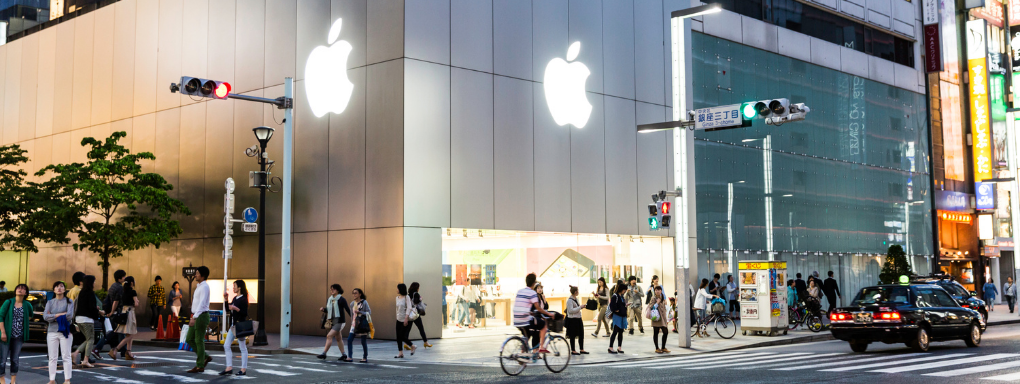There's no denying that the retail industry had to constantly adapt to some significant changes recently. With COVID-19 still impacting communities around the globe, it's no wonder that small businesses and large corporations alike have to update their work models to accommodate their employees.
Apple Inc. recently announced its plans for retail employees moving forward. The new "Retail Flex" pilot program allows Apple store employees to work from home for a few days of the week. They will be responsible for handling tech support and online sales.
COVID-19’s Impact on Apple
Apple's Retail Flex program is set to debut this fall and with a few employees. Apple is known for releasing new iPhone models and other gadgets this time of year, so it'll be interesting to see how successful this new program will be during a busy time.
Employees asked to participate in the Retail Flex option will commit to the hybrid work model for six months to test if it's a viable solution.
Apple stores were closed for much of 2020, and the goal is to have safe face-to-face interactions between employees and customers looking to purchase new tech, such as the rumoured iPhone 13.
At the height of the pandemic, Apple sent workers home with their full salaries and even began sending them coronavirus test kits.
Current Retail Tech and Trends
It's no wonder tech giant Apple has adopted a hybrid approach to its retail operations. As the pandemic continues to ripple across the country, leadership teams and executives have to formulate plans for reopening — for example, Spotify and Twitter have announced that their teams can work remotely "forever."
While those organizations don't have traditional brick-and-mortar locations, many other small businesses had to shut their doors due to the pandemic.
As pandemic-related pressures ease, mandates lift, and more people get vaccinated, retailers need to prioritize their employees' health and improve customer experience (CX). In fact, many companies will make CX a top priority in the next five years.
In addition to this trend, supply chains may face disruptions, leading to low inventory levels. The goal is to incorporate new technologies to make up for this issue and deliver products using "just-in-time" suppliers. Artificial intelligence (AI) and machine learning (ML) are expected to improve operational efficiency in retail stores.
E-commerce experienced a massive boom during the pandemic — the global sector grew to $26.7 trillion due to the deadly virus outbreak. More people shopped online during lockdowns, and the trend will likely continue to impact retailers of all sizes. With customers making health a priority, retailers will need to adapt their operations to accommodate an ever-changing situation.
Working From Home in the Retail Industry
Work-from-home or hybrid models have been adopted by plenty of companies across all industries. Research shows that 54% of employees want to continue even after the pandemic ends.
However, this presents some challenges that need to be addressed. How can retail employees work from home when so much of their daily tasks revolve around being in-store? It's certainly worth exploring what options are available if employers are looking to reduce the spread of the delta variant.
The retail industry was already making a digital transformation, and these issues are only adding to the pressure. Retailers will need to:
- Facilitate growth
- Optimize their workforce
- Make strategic decisions to drive business forward
One potential solution will be incorporating data analytics to help with forecasting, inventory management and scheduling of employees. Using technology will be necessary for the retail industry if brick-and-mortar stores want to survive the remainder of the pandemic.
Apple's Bottom Line
More customers will likely see online shopping experiences ramp up during the launch of new products, such as iPhones, iPads, Apple Watches and more.
CEO Tim Cook announced in an internal email to corporate employees that they'll be asked to come into the office to work on Mondays, Tuesdays and Thursdays. They'll also have the flexible option to work from home on Wednesdays and Fridays.
While many businesses struggle to find workers in a tight labour market, they've also decided to be more flexible around scheduling, offer improved benefits, raise wages and even add special bonuses.
It's no secret that the entire retail industry, including Apple stores, would be impacted by the pandemic. While e-commerce reaped the benefits, brick-and-mortar stores will need to adapt to stay afloat.
An Uncertain Future for Retailers
Becoming comfortable with uncertainty is something everyone had to learn during the height of the coronavirus pandemic. Retailers will have to follow suit by leveraging technology to improve operations and be flexible and agile while prioritizing cleaning protocols and sanitation. The future may be uncertain, but implementing flexible work options will remain critical in the next few years.




